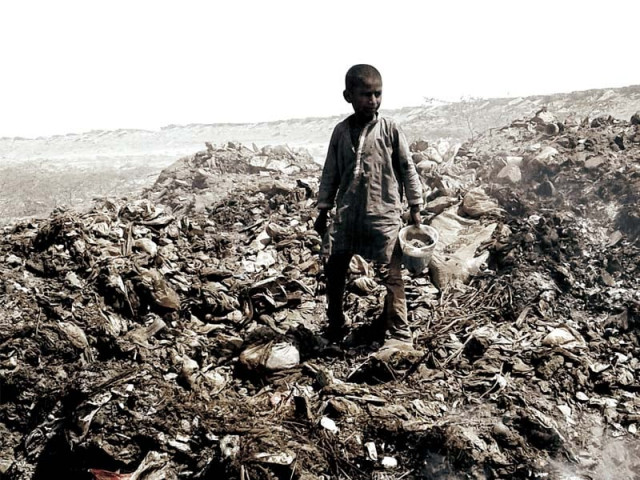Children of trash, covered in ash
On the outskirts of Karachi, a whole generation is going to waste

Children as young as five years of age help their families look for recyclable items among the piles of rubbish dumped near their village. The residents, almost all of whom work in this profession, care little for health or education. PHOTOS: EXPRESS
She scours through the mounds of rubbish, looking for bits of metal, plastic, glass and animal bones. While girls her age attend school, 12-year-old Qazbano rummages through the burning heaps of rubbish directly under the ruthless glare of the scorching Karachi sun. At the end of each day, she is happy to take the Rs50 she earns for her efforts.
“The Rs50 mean everything to us mamma [uncle],” she tells The Express Tribune. The way she says it is consistent with someone who is wise beyond her years. “No, I have never been to school,” she says matter-of-factly, clapping her tiny hands together to shake off the ash.
A life of waste
Over the years, Qazbano has devised a way to rummage through the burning trash without causing too much damage to her hands. She uses a stick to scour through the burning plastic and paper as she looks for the coveted metal, unburned plastic and glass — anything that would be of value to her employer. Her hair and eye-lashes appear white due to the ash and burn marks mar her hands. “Yes, it stings but I don’t really care,” she smiles wryly. “I’m used to it now. It doesn’t hurt as bad anymore.”
Most children of Goth Noor Muhammad, located around 25 kilometres from Karachi, help their families collect scrap from the trash generated by the city that is dumped around the hilly area near the village.
Read: A garbage picker from Quetta makes a movie, tells his tale
The families work at the ‘Theeya’ where the dumper driver unloads waste, charging Rs50 for the ‘favour’. According to the villagers, around 50 dumpers are unloaded around the village on average, each day. The families burn the garbage after sunset and start collecting pieces of metal and other valuables the next morning.
“It burns throughout the night. We collect the metal and sell it,” says Rani, one of the elderly women of the village. Each member of the family works from morning to dusk every day, making hardly Rs300 at the end of it. “Garbage means nothing for people, but it is everything for us,” she says.
Garbage is everything
Normally, one would avoid even standing next to the waste. In this village, though, it is the rubbish that has attracted most of the village’s population to settle in the area. A majority of its residents hail from Umerkot, Jhuddo, Naukot, Tando Muhammad Khan, Malir and other areas of Karachi as well as the southern districts of the province.

Suleman alias Sillo, another resident, explains that the entire village is dependent on collecting recyclable material from Pakistan’s largest trash-production arena — Karachi. “We all came here for work,” he said. “The whole family works and hardly manages to make enough for three meals a day.”
These families don’t have the privilege of sparing a thought for their health and the impact of collecting metal and other things without safety equipment. They live near it and inhale the toxic smoke emanating from the burning rubbish every night.
“Burning trash is dangerous for the environment as well as for human beings,” says Shehri’s Roland de Souza. The issue is not just limited to Goth Noor Muhammad, with garbage being burned across the city. “The garbage can be used in a productive manner but we don’t think in the right direction,” he lamented.
Read: This is what the face of the poorest of poor in Pakistan looks like
“Why aren’t the landfill sites in Pakistan being used properly?” he questioned, adding that politicians don’t think about this particular issue.
Doctors’ warning
Medical experts believe that the entire village should be screened immediately. “Such living and working conditions will definitely cause irreversible damage to the respiratory system,” said senior family physician, Dr Abdul Ghafoor Shoro. “A lot of dangerous gases are released when trash is burnt,” he explained, adding that most people who live near such sites complain of problems in the ear, nose, throat and also suffer from chronic lung diseases.
Wishing for a better life
Like any girl her age, Qazbano wishes she could wear clean clothes and go to school but her family’s financial status doesn’t allow her such liberties. “We are very poor uncle. We just can’t afford to go to school,” she says in a heartbroken voice that is trembling with emotion. She even goes to her Theeya when the authorities advise people to remain inside their homes whenever a heat wave hits the area.
Published in The Express Tribune, October 5th, 2015.



















COMMENTS
Comments are moderated and generally will be posted if they are on-topic and not abusive.
For more information, please see our Comments FAQ